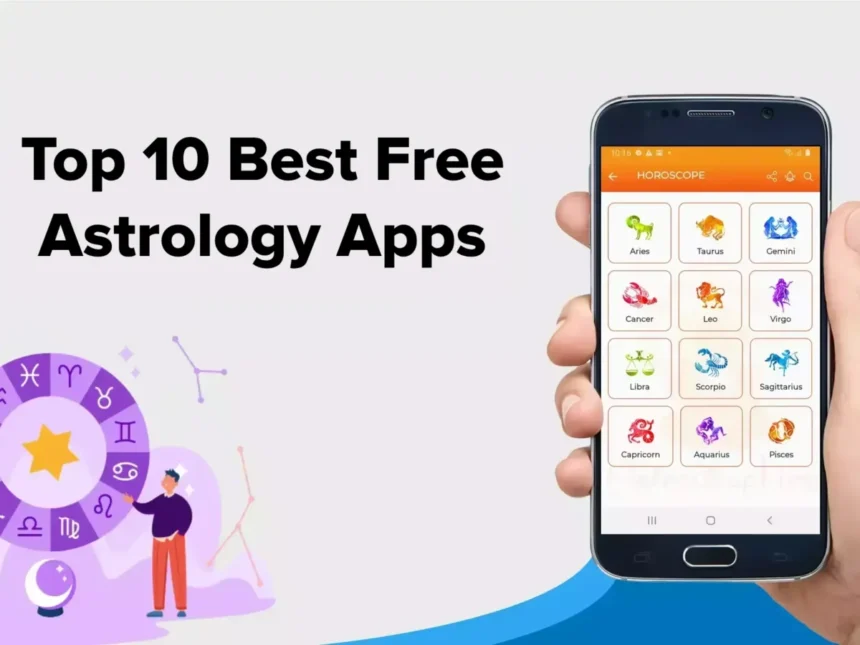Astrology has always illuminated the human wonder with the cosmos. For millennia, people from cultures across our globe have turned to astrologers for predictions about their destiny, how to overcome obstacles they are facing in their lives, and to help steer their personal ship through uncharted waters. In India, the astronomical revealed philosophy of *Jyotish Shastra* (the science of light) has provided a more well-rounded view of astrological practice that combines mathematics and spiritual wisdom. However, our current modern world and economy have given us a post-modern spiritual tradition of free astrology chat apps powered by artificial intelligence. These apps essentially bring cosmic back to our fingertips with apps promising instant cosmic valid insights and everyday horoscopes, absolutely free. What remains in both the minds of astrologers and consumers is the eternal question of which one is better – the ancient paradigm of Jyotish, or the free astrology chat app?
The answer needs to come from placing yourself into both paradigms – the intentionally executed complex, ritualistic, astronomically revealed, relationship-based process of Jyotishi chart-reading and planetary alignment, and the digital world, with apps where an AI algorithm calculates massive amounts of astrology data in seconds. Each paradigm has its strengths and blind spots, and each paradigm has its own rights of passage to engage seekers.
The Ageless Attraction of Jyotish
Jyotish originates primarily from Indian philosophy and spirituality. While western astrology can become muddled in sun signs or generalised predictions, Jyotish is established from the accurate calculations of the planets, lunar nodes (*Rahu* and *Ketu*), and the twelve houses of a person’s horoscope.
When working for a client, a traditional astrologer not only interprets the positions of the planets, but also the less tangible elements like planetary periods (*dashas*), transits or progressions (*gochara*), and planetary divisions. For many seekers, sitting in front of an astrologer has less to do with predictions and more to do with blessings, reassurance, and sometimes even instructions on how to conduct remedies (like puja) for those difficult planets. The process is intimate, holistic, and very personal.
When the Universe Meets Programming: The Launch of Free Astrology Chat Apps
The availability of free astrology chat apps has changed how people connect with the stars. Instead of making the appointment for readings and making the journey to the astrology office, seekers are going to download a free (or ad-supported) app, input their birth information, and have a full analysis and chart (a reading!) in 3-10 minutes. It is easy, fast, and inclusive for anyone who has a phone.
With many of these apps having artificial intelligence behind them, the user experiences services that extend far beyond simple horoscopes. Users can now text in real-time and can ask their own questions about any aspect of their life: love, career, finances, health, etc. The chat format is very similar to the way we communicate today, people are in a hurry and naturally a little expectant of inquiries about their futures, expected development of relationships, and that they will get some response within a time-frame. In comparison, the first-time user experience is created similarly to some classic literary form of engagement, and systems now enable the conveyance of astrology to a large group almost simultaneously – everything is accessible and conversational, and as expected, immediate.
Although the articulations are nowhere as dynamic as humans’, they are thankfully still able to encapsulate a good measure of time and ease and are astoundingly accurate. For Gen-Zers, who have been raised on instant messaging and who are accustomed to a mobile-first experience in all their life areas, talking to an AI astrologer is now less like consulting an oracle, but perhaps more similar to immediately speaking to an app next to them that’s very immediate. Astrology apps are also modern, accessible, and perhaps significantly interactive.
Why Traditional Jyotish Is Important
Traditional Jyotish has centuries of legitimacy and a feeling of specialness. It is often part of a cultural practice and for many Indians — and believers everywhere — consulting a Jyotishi is as much about faith as it is about practicality. There are the astrologer’s prescriptions for remedies: wear gemstones, recite mantras, or perform rituals. This kind of activity goes beyond prediction and offers grace and balance.
This level is absent when consulting an AI astrology app, as they employ only data and text analysis. The Jyotishi’s approach is layered with context, empathy, and ritual, none of which can be found in an algorithm.
The Appeal of AI Astrology Apps
However, while apps may not have a ritual component, they have accessibility built in. Take, for instance, a college student in New York who has a question about their compatibility with a new partner, or a young professional in Delhi wondering about their overall career path. Instead of making a hotline appointment with a Jyotishi, they can use an astrology app as late as midnight — they can put their questions in and get clarity about their situation right away.
In fact, free chat apps also democratize astrology by allowing costs, geography, or even language to be less of a barrier. Many companies are trying to offer readings in many languages and/or are planning to expand globally by gathering users for readings through technology.
Depth vs. Accessibility: Two Worlds, Two Experiences
Traditional Jyotish often represents hours and hours of preparation, where the astrologer researches charts, considers transitions, and then offers a prediction or insight. This is often done in a very thorough way, relying on both mathematics and intuitive reasoning. A seasoned Jyotishi will have potentially decades of practice incorporated into their interpretation, as well as the human touch that no app will replicate.
AI astrology, however, has its own benefits. Algorithm-based astrology can take enormous amounts of data and assess or validate that data at lightning speed, including cross-referencing any number of patterns on the charts (thousands of charts). This capability provides AI astrology a level of consistency and breadth which even the most accomplished Jyotishi would be unable to replicate. While humans may rely upon their memory and intuition to some degree when using traditional systems, AI systems have coded logic, so there should be less reliance on human tendencies of bias.
Cultural experience, ceremony, and the importance of touch
The cultural aspect of astrology is paramount in this comparison. For many, the experience of a Jyotishi visit is a product of culture, family, and ceremony. People often consulted astrologers for weddings in India, to match horoscopes, and this practice still holds great respect and faith. Groups of people meet as families and do chart comparisons while a Jyotishi provides suggestions to remedy possible disharmony.
It is hard to picture this experience happening completely by an app, regardless of how sophisticated the app may be. Astrology in this case is not just prediction; it’s a community, a belief, and continuity of culture.
Digital Spirituality for a Mobile Generation
At the same time, younger generations are becoming more and more comfortable with digital spirituality. While meditation apps have replaced the work of visiting yoga ashrams for many, free astrology chat apps are becoming one of the first places millennials and Gen Z are encountering astrology.
The relaxed and informal field of chatting with an AI astrologer makes astrology feel less scary. Someone who may get overwhelmed approaching a Jyotishi in person — perhaps fear of judgment or just lack of access — can now explore their horoscope through the ease of an app.
Could One Replace the Other? Or Do They Co-Exist?
So which is the better? This question does not have an easy answer, as it all depends on the context and expectations of the seeker. If one is seeking depth, remedies, or a connection to spiritual insight, traditional Jyotishis will continue to be irreplaceable. If a seeker needs an instant view of their chart, fun compatibility apps, or free and on-the-go guidance, the apps are likely better.
In many respects, the two practices fit nicely together. The seeker may use apps to familiarise themselves with the basis of their chart, and then engage the depths of a Jyotishi’s insight for deeper exploration. A Jyotishi may use tools to quickly create a chart, taking the wisdom of the practitioner into the realm of astrology.
The Hybrid Future: Integrating AI with Traditional Knowledge
What is evident is that astrology, like countless other ancient practices, is not being supplanted by technology, but rather it is being altered by it. Free astrology chat applications are not a threat to Jyotish; they are merely an evolution of its accessibility. They act as a marker for the interested and a format for the engaged.
Traditional Jyotish, on the other hand, continues to live in some form of largely unaffected continuity due to its gravitas, historical basis, and human interface that technology cannot replace. Each is right in its own way, and perhaps the true strength is in recognising both worlds.
Hybrid applications are already in development, where AI does its best to interpret a chart as far as it can, and then interpreters/astrologers fill in the gaps. This is perhaps the best priming of both systems provides speed, precision, and a human emotional influence. For the seeker, a hybrid provides more options and flexibility to access astrology in what fits best for them.
Final Thoughts: Choosing What Works for You
Ultimately, astrology is ultimately less about the method and more about the meaning it creates in our lives. Whether someone is chatting with a jyotishi under the dim light of an oil lamp or pinging an AI astrologer through a glowing screen, the intention is the same to be pointed, comforted, and eased through life uncertainty. Technology may change the modality, but the stars will always remain constant.
So maybe the question is not “which one’s better,” but “which one’s better for you right now,” If you want tradition, ritual, and depth, Jyotish will always be a sacred place to land. If you want convenience, speed, and play, free astrology chat apps will work for you wherever you are. The miracle of our time is that you don’t have to pick! The universe is big enough for both, and so is your path to self-reflection.


